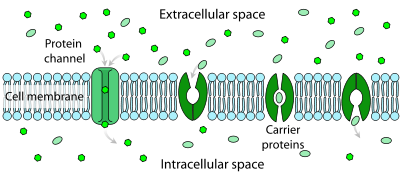- Membrane transport protein
-
A membrane transport protein (or simply transporter) is a membrane protein[1] involved in the movement of ions, small molecules, or macromolecules, such as another protein across a biological membrane. Transport proteins are integral membrane proteins; that is they exist within and span the membrane across which they transport substances. The proteins may assist in the movement of substances by facilitated diffusion or active transport. These mechanisms of action are known as carrier-mediated transport.[2]
Contents
Types
(Grouped by Transporter Classification database categories)
1: Channels/Pores
2: Electrochemical Potential-driven transporters
- Mitochondrial membrane transport protein
- Glucose transporter
- Neurotransmitter transporters
- Glutamate/aspartate transporters
- GABA transporters
- Glycine transporters
- Monoamine transporters, including:
- Dopamine transporter (DAT)
- Norepinephrine transporter (NET)
- Serotonin transporter (SERT)
- Vesicular monoamine transporters (VMAT)
- Adenosine transporters
- Vesicular acetylcholine transporter (VAChT)
3: Primary Active Transporters
- ATP-binding cassette transporter genes
- V-ATPase
- Ion transporters
4: Co-transporters
Symporters transport two or more ions together in the same direction, antiporters in the opposite direction.
5: Incompletely Characterized Transport Systems
- 9.A.50: Karyopherin
Ungrouped
See also
- Carrier protein
- Cotransport
- Cotransporter
- Ion channel
- P-loop
- Solute carrier family (classification)
- TC number (classification)
- Vesicular transport protein
References
External links
- "Transport protein" at Dorland's Medical Dictionary
Fatty acid Hormone peptide hormone: Follistatin · Growth hormone binding protein · Insulin-like growth factor binding protein (IGFBP1, IGFBP2, IGFBP3, IGFBP4, IGFBP5, IGFBP6, IGFBP7) · Neurophysins (Neurophysin I, II)
steroid hormone: Sex hormone binding globulin/Androgen binding protein · Transcortin · Thyroxine-binding globulin · TransthyretinMetal/element calcium (Calcium-binding protein, Calmodulin-binding proteins) · copper (Ceruloplasmin) · iron (Iron-binding proteins, Transferrin receptor)Vitamin Other Acyl carrier protein · Adaptor protein · Cholesterylester transfer protein · F-box protein · GTP-binding protein · Latent TGF-beta binding protein · Light-harvesting complex · Major urinary proteins · Membrane transport protein · Odorant binding proteinB proteins: BY STRUCTURE: membrane, globular (en, ca, an), fibrous Ca2+: Calcium channel Ligand-gatedNa+: Sodium channel Constitutively activeProton gatedK+: Potassium channel Kvα1-6 (1.1, 1.2, 1.3, 1.4, 1.5, 1.6, 1.7, 1.8) · (2.1, 2.2) · (3.1, 3.2, 3.3, 3.4) · (4.1, 4.2, 4.3) · (5.1) · (6.1, 6.2, 6.3, 6.4)
Kvα7-12 (7.1, 7.2, 7.3, 7.4, 7.5) · (8.1, 8.2) · (9.1, 9.2, 9.3) · (10.1, 10.2) · (11.1/hERG, 11.2, 11.3) · (12.1, 12.2, 12.3)
Kvβ (1, 2, 3) · KCNIP (1, 2, 3, 4) · minK/ISK · minK/ISK-like · MiRP (1, 2, 3) · Shaker geneOther HVCN1Generalsee also disorders
B memb: cead, trns (1A, 1C, 1F, 2A, 3A1, 3A2-3, 3D), othrBy group SLC1–10 - (6) sodium- and chloride- dependent sodium:neurotransmitter symporters (SLC6A1, SLC6A2, SLC6A3, SLC6A4, SLC6A5, SLC6A6, SLC6A7, SLC6A8, SLC6A9, SLC6A10, SLC6A11, SLC6A12, SLC6A13, SLC6A14, SLC6A15, SLC6A16, SLC6A17, SLC6A18, SLC6A19, SLC6A20)
- (7) cationic amino-acid transporter/glycoprotein-associated (SLC7A1, SLC7A2, SLC7A3, SLC7A4) glycoprotein-associated/light or catalytic subunits of heterodimeric amino-acid transporters (SLC7A5, SLC7A6, SLC7A7, SLC7A8, SLC7A9, SLC7A10, SLC7A11, SLC7A13, SLC7A14)
- (8) Na+/Ca2+ exchanger (SLC8A1, SLC8A2, SLC8A3)
SLC11–20 - (12) electroneutral cation-Cl cotransporter (SLC12A1, SLC12A1, SLC12A2, SLC12A3, SLC12A4, SLC12A5, SLC12A6, SLC12A7, SLC12A8, SLC12A9)
- (14) urea transporter (SLC14A1, SLC14A2)
- (15) proton oligopeptide cotransporter (SLC15A1, SLC15A2, SLC15A3, SLC15A4)
- (16) monocarboxylate transporter (SLC16A1, SLC16A2, SLC16A3, SLC16A4, SLC16A5, SLC16A6, SLC16A7, SLC16A8, SLC16A9, SLC16A10, SLC16A11, SLC16A12, SLC16A13, SLC16A14)
SLC21–30 - (21) organic anion transporting (SLCO1A2, SLCO1B1, SLCO1B3, SLCO1B4, SLCO1C1) (SLCO2A1, SLCO2B1) (SLCO3A1) (SLCO4A1, SLCO4C1) (SLCO5A1) (SLCO6A1)
- (22) organic cation/anion/zwitterion transporter (SLC22A1, SLC22A2, SLC22A3, SLC22A4, SLC22A5, SLC22A6, SLC22A7, SLC22A8, SLC22A9, SLC22A10, SLC22A11, SLC22A12, SLC22A13, SLC22A14, SLC22A15, SLC22A16, SLC22A17, SLC22A18, SLC22A19, SLC22A20)
- (24) Na+/(Ca2+-K+) exchanger (SLC24A1, SLC24A2, SLC24A3, SLC24A4, SLC24A5, SLC24A6)
- (25) mitochondrial carrier (SLC25A1, SLC25A2, SLC25A3, SLC25A4, SLC25A5, SLC25A6, SLC25A7, SLC25A8, SLC25A9, SLC25A10, SLC25A11, SLC25A12, SLC25A13, SLC25A14, SLC25A15, SLC25A16, SLC25A17, SLC25A18, SLC25A19, SLC25A20, SLC25A21, SLC25A22, SLC25A23, SLC25A24, SLC25A25, SLC25A26, SLC25A27, SLC25A28, SLC25A29, SLC25A30, SLC25A31, SLC25A32, SLC25A33, SLC25A34, SLC25A35, SLC25A36, SLC25A37, SLC25A38, SLC25A39, SLC25A40, SLC25A41, SLC25A42, SLC25A43, SLC25A44, SLC25A45, SLC25A46)
SLC31–40 - (32) vesicular inhibitory amino-acid transporter (SLC32A1)
- (33) Acetyl-CoA transporter (SLC33A1)
- (35) nucleoside-sugar transporter (SLC35A1, SLC35A2, SLC35A3, SLC35A4, SLC35A5) (SLC35B1, SLC35B2, SLC35B3, SLC35B4) (SLC35C1, SLC35C2) (SLC35D1, SLC35D2, SLC35D3) (SLC35E1, SLC35E2, SLC35E3, SLC35E4)
- (36) proton-coupled amino-acid transporter (SLC36A1, SLC36A2, SLC36A3, SLC36A4)36A2 ·
- (37) sugar-phosphate/phosphate exchanger (SLC37A1, SLC37A2, SLC37A3, SLC37A4)
- (38) System A & N, sodium-coupled neutral amino-acid transporter (SLC38A1, SLC38A2, SLC38A3, SLC38A4, SLC38A5, SLC38A6, SLC38A10)
- (39) metal ion transporter (SLC39A1, SLC39A2, SLC39A3, SLC39A4, SLC39A5, SLC39A6, SLC39A7, SLC39A8, SLC39A9, SLC39A10, SLC39A11, SLC39A12, SLC39A13, SLC39A14)
- (40) basolateral iron transporter (SLC40A1)
SLC41–48 SLCO1–4 Ion pumps see also solute carrier disorders
B memb: cead, trns (1A, 1C, 1F, 2A, 3A1, 3A2-3, 3D), othrVesicular Other A B C D E F G see also ABC transporter disorders
B memb: cead, trns (1A, 1C, 1F, 2A, 3A1, 3A2-3, 3D), othrF- and V-type ATPase (3.A.2) P-type ATPase (3.A.3) - 3.A.3.1.1: Na+/K+ transporting: ATP1A1, ATP1A2, ATP1A3, ATP1A4, ATP1B1, ATP1B2, ATP1B3, ATP1B4, ATP1G1
- 3.A.3.1.2: H+/K+, H+/K+ exchanging: ATP4A, ATP4B
- 3.A.3.1.4: H+/K+ transporting, nongastric: ATP12A
- 3.A.3.2: Ca+ (SERCA, PMCA, SPCA) / Ca++ transporting: ATP2A1, ATP2A2, ATP2A3, ATP2B1, ATP2B2, ATP2B3, ATP2B4, ATP2C1
- 3.A.3.8.8: flippase: ATP8A2
Other/ungrouped:
see also ATPase disorders
B memb: cead, trns (1A, 1C, 1F, 2A, 3A1, 3A2-3, 3D), othrCategories:- Transport proteins
- Transmembrane transporters
Wikimedia Foundation. 2010.

